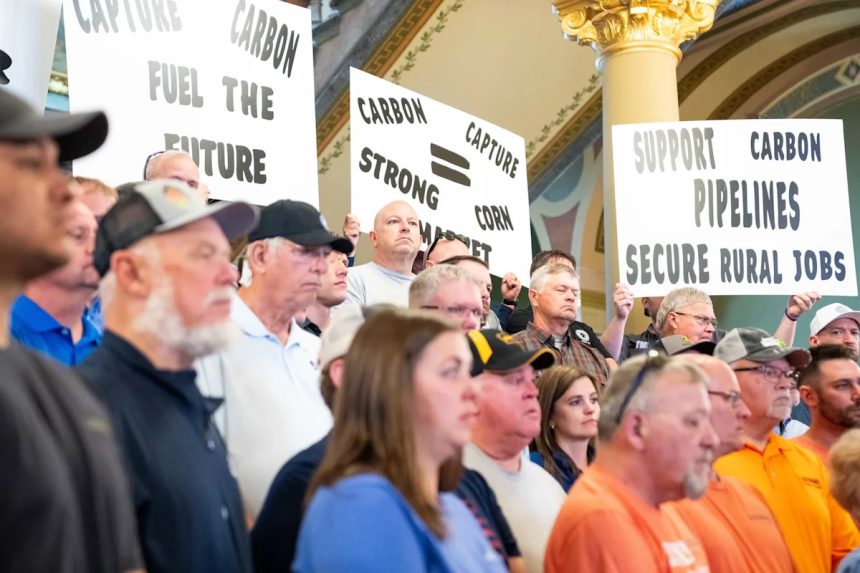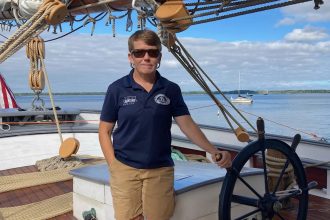With Summit Carbon Solutions’ planned route effectively blocked by South Dakota’s ban on the company’s use of eminent domain, opponents question where it intends to sequester the carbon dioxide a $9 billion pipeline it proposes would collect from Iowa and other Midwestern ethanol plants.
The sequestration site is supposed to be in North Dakota, but reaching that state is problematic without running the pipeline through South Dakota, where Ames-based Summit not only faces the eminent domain ban but has yet to obtain a permit.
Attorneys at a Polk District Court hearing Friday, Oct. 10, puzzled over the pipeline’s route as they debated whether Judge Scott Beattie should move forward with a judicial review of Summit’s Iowa permit for pipeline construction or, as Summit requests, return the case to the Iowa Utilities Commission so the panel can consider the company’s request to amend its permit.
Iowa farmers gather to show their support of carbon pipelines on May 9, 2025, at the Iowa State Capitol.
That would make it possible for the company to consider other possible sites for sequestering the carbon emissions.
Bret Dublinske, a Summit attorney, said Friday that North Dakota used to be the only option. But now Tallgrass Energy is capturing carbon with its Trailblazer pipeline through Nebraska and sequestering it in Wyoming, and Colorado and Kansas, along with Nebraska, are seeking federal approval to store carbon, he said.
“We’re asking for permission to explore all options,” Dublinske said.
Iowa regulators made approval of Summit’s permit contingent on it getting a permit to build the pipeline through South Dakota. The state’s regulators have twice rejected the company’s application, most recently, because it lacked a viable route after the ban on allowing it to use eminent domain, which would have enabled it to obtain access to property for the project from unwilling landowners.

People hold signs as pipeline opponents speak during a rally against eminent domain for carbon capture pipelines on Tuesday, March 18, 2025, in Des Moines.
Christina Gruenhagen, the Iowa Farm Bureau’s government relations counsel, said the project should go back to the state regulators to determine if it’s viable.
“It’s not clear whether this pipeline is still going to North Dakota, or will go around South Dakota, whether it’s going to stop in Nebraska, go to Wyoming, go to Kanas, we don’t know,” Gruenhagen said.
She said it raises questions about the use of eminent domain in Iowa, which some lawmakers want to strike down, and if the pipeline serves a public purpose.
“At this point, we don’t know whether that pipeline can be completed to achieve the public purpose of sequestering carbon dioxide,” she said.
Here’s what to know about the discussion at Friday’s hearing.
What is Summit saying about its route and sequestration plans?
Summit spokesperson Sabrina Zenor said in a text Friday that the company’s proposed permit amendment “keeps open the option to transport CO2 west through Nebraska or north through South Dakota, which is part of our original permit.”
Summit wants to remove North Dakota as the sequestration location, change the pipeline size in some areas and add a customer.
Taking the pipeline through Nebraska could make Nebraska, Wyoming, Kansas and Colorado possible sequestration options.
Summit announced plans four years ago to build the 2,000-mile pipeline to capture carbon dioxide from dozens of ethanol plants in Iowa, South Dakota, Minnesota and Nebraska, liquefy it under pressure, and sequester it deep underground in North Dakota.
Despite the challenges that have emerged, the company has said it remains committed to the project. Proponents say the pipeline would significantly lower the carbon footprint of ethanol made in Iowa and other states it serves, expand markets and qualify the corn-derived fuel as low carbon, making it eligible for generous federal tax credits.
“Our focus is on supporting as many ethanol partners as possible and building a strong foundation that helps farmers, ethanol plants, and rural communities access the markets they’ll depend on for decades to come,” Zenor said in her text Friday.
What’s the issue before the Polk District Court?
Nine Iowa counties, the Sierra Club’s state Chapter, landowners and others are challenging the Iowa Utilities Commission’s decision last year to give Summit a permit to build nearly 700 miles of pipeline across the state.
Wally Taylor, the Sierra Club’s attorney; Brian Jorde, an Omaha attorney representing dozens of landowners; and others argued that the issues Beattie will consider are broader than those included in Summit’s proposed permit amendment.
Additionally, Jorde said that Summit should have known in 2023 that it would have difficulty getting a pipeline permit in South Dakota. The company lost its first permit request two years ago and legislative restrictions already were being proposed, he said. “They have done this to themselves,” Jorde said. “They have charted their own course, and now they want a redo.”
Dublinske said that argument doesn’t hold up: North Dakota also initially rejected Summit’s pipeline permit request in 2023, but the company won approval a year later.
Attorney: Summit seeks a ‘wholesale reboot’ of final order
Jason Craig, an attorney for the Iowa counties, said Summit seeks to move the case back to the utilities commission to “pursue an entirely new contested case proceedings — to change the project, change the route, change the pipe engineering, change the conditions of the permit” and consolidate the original pipeline with its proposed expanded route.
“That amendment will require full hearing procedures and will result in a separate final decision,” he said. “That’s not supplementing the record, your honor. That’s a wholesale reboot of the final order.”
But Beattie expressed concern that if he moves forward with the judicial review, yet the permit also is amended, appellate courts could have “two independent and separate records that could result in conflicting matters.”
“Doesn’t it make more sense to send it back, let the commission sort all that out, put it in one clear package, and then move forward?” Beattie said.
Craig said landowners deserved to have the judge review the case instead of sending it back to the commission for “potentially years more” delay.
Beattie said he expects to issue a decision within a couple of weeks.
Donnelle Eller covers agriculture, the environment and energy for the Register. Reach her at deller@registermedia.com.
This article originally appeared on Des Moines Register: Summit says western states are destination options for pipeline









